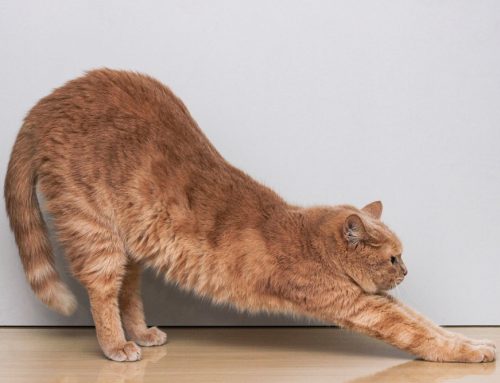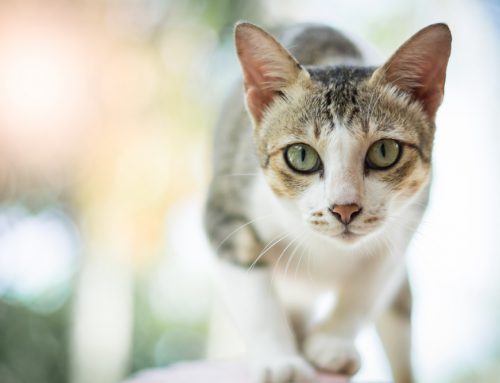It’s common practice to routinely load up dogs for regular veterinary visits, but not so much for cats. Many pet owners believe their indoor-only house cat doesn’t need routine wellness care, since she doesn’t venture outdoors the way dogs do, but nothing could be further from the truth. Cats are experts at hiding signs of illness, and your feline friend requires just as much preventive veterinary care as a dog to remain healthy and happy for years to come.
What should I ask during my cat’s wellness exam?
During your cat’s wellness exam, we will chat about many aspects of feline health care and why each is important to her overall health. Several key factors for cat care include:
- Nutrition
- Exercise
- Dental care
- Litter box habits
- Environmental enrichment
- Routine veterinary care
Your cat’s veterinary visit is the perfect time to discuss how to prevent future health issues. The best medicine is preventive medicine.
Nutritional requirements for cats
Cats are not small dogs when it comes to nutritional requirements, even though they’re just as prone to obesity. Unlike other household pets, cats are obligate carnivores, meaning they need meat to survive. Taurine, an amino acid found only in animal-based protein, is an essential building block for many bodily functions. Diets deficient in taurine can lead to blindness, cardiomyopathy, and even death if uncorrected.
When discussing nutrition and diet for cats, we can’t forget about adequate hydration. Cats typically would receive most of their water intake from eating small prey animals, but with a diet consisting solely of dry kibble, inadequate hydration is bound to occur. Mice are roughly 70% water, so switching a cat (who has not passed through the evolutionary process quite as far as a dog) to a strict dry food diet fails to satisfy her hydration needs. Their natural behavior may not encourage them to drink more to make up for the lack of water in their food, leading to health issues, such as kidney and urinary disease.
Exercise requirements for cats
Cats tip the scales at overweight or obese levels even more frequently than dogs. In fact, more than half—60%—of all American cats are overweight or obese. With ever-expanding girths, cats are at higher risk for several diseases, including diabetes, hypertension, liver disease, and cancer. Shed those extra pounds with daily exercise.
While it may not be simple to clip a leash to your cat for a stroll around the block, she still needs to get up and get moving. Try these toys and games to incorporate several five-minute play sessions into her day:
- Feather wand toys
- Ping-pong balls
- Robotic mice
- Catnip toys
- Climbing towers
- Food puzzles
- Crumpled paper balls
If you have a home with multiple levels, put your cat’s food and water bowls on one floor, and place her bed on another. Strive to make her walk as far as possible for food, burning calories before she consumes more.
Another way to fulfill your cat’s exercise requirements is to create a variety of environmental enrichment opportunities. Use vertical space, such as wall shelves, climbing towers, and perches to offer a lookout post. Use scratching posts to satisfy your cat’s natural urge to scratch and care for her claws.
Dental care requirements for cats
Feline mouths are not nearly as easy to peer inside as a panting canine mouth, but dental health is critical for a happy cat. Some cats suffer from resorptive disease. Painful lesions erode tooth enamel due to an overactive immune system attacking the teeth. In addition to resorptive disease, cats can accumulate tartar just like dogs, leading to stinky breath, painful gingivitis, and the potential for infection.
During your cat’s routine veterinary visit, we will check her dental health, grading gingivitis and tartar buildup. Then, we may recommend scheduling a dental cleaning to return your feline friend’s oral health back to peak condition, leaving you with the task of at-home preventive care. (Yes, you can brush your cat’s teeth!)
Litter box requirements for cats
Known as pristine pets, cats naturally want a clean spot to do their business. Dirty litter boxes can cause your cat to eliminate inappropriately on your bed, your favorite jacket, or your couch. Attract your cat to the litter box by keeping it scooped clean multiple times a day; filling it with unscented, fine litter; and placing it away from heavy traffic and loud noises, such as the washer and dryer.
Veterinary care requirements for cats

In addition to the standard core vaccinations required to keep your cat healthy, we perform a variety of tasks designed to help your feline friend live a long and healthy life. During a routine visit, we may:
- Deworm your cat for intestinal parasites
- Check a urine sample to ensure the kidneys are concentrating urine appropriately
- Run a wellness blood work panel to check organ function and receive your pet’s baseline values
- Perform a blood pressure check
- Test for early signs of kidney disease, a common cause of death in older cats
- Check a blood sugar level for diabetes
- Listen to your cat’s heart for a gallop rhythm, a sign of hypertrophic cardiomyopathy
- Discuss a diet plan to stave off diabetes and osteoarthritis
Routine veterinary care can prevent a wide variety of feline diseases and, if caught in the early stages, can greatly increase your cat’s chance of fighting off illness.
Ready to show your feline friend some love? Schedule a wellness visit for her continued health and happiness.








Leave A Comment